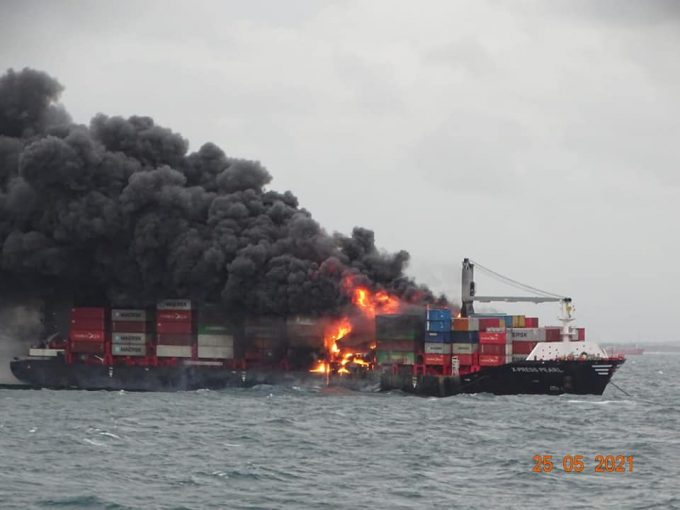Red Sea crisis proving 'a boom period' for feeder operators
The ‘new normal’ of ocean shipping disruption is good news for feeder operators, which have ...
FDX: ABOUT USPS PRIVATISATIONFDX: CCO VIEWFDX: LOWER GUIDANCE FDX: DISRUPTING AIR FREIGHTFDX: FOCUS ON KEY VERTICALFDX: LTL OUTLOOKGXO: NEW LOW LINE: NEW LOW FDX: INDUSTRIAL WOESFDX: HEALTH CHECKFDX: TRADING UPDATEWMT: GREEN WOESFDX: FREIGHT BREAK-UPFDX: WAITING FOR THE SPINHON: BREAK-UP ALLUREDSV: BREACHING SUPPORTVW: BOLT-ON DEALAMZN: TOP PICK
FDX: ABOUT USPS PRIVATISATIONFDX: CCO VIEWFDX: LOWER GUIDANCE FDX: DISRUPTING AIR FREIGHTFDX: FOCUS ON KEY VERTICALFDX: LTL OUTLOOKGXO: NEW LOW LINE: NEW LOW FDX: INDUSTRIAL WOESFDX: HEALTH CHECKFDX: TRADING UPDATEWMT: GREEN WOESFDX: FREIGHT BREAK-UPFDX: WAITING FOR THE SPINHON: BREAK-UP ALLUREDSV: BREACHING SUPPORTVW: BOLT-ON DEALAMZN: TOP PICK

The 2021 X-Press Pearl fire, reportedly the worst maritime disaster in Sri Lanka, has become controversial amid allegations of corruption in handling compensation claims under the previous government.
The island nation had a political leadership change in September, with left-leaning Anura Kumara Dissanayake elected as its new president.
Containership X-Press Pearl, owned by Singapore-based X-Press Feeders, burned for almost two weeks before sinking off the Sri Lankan coast, sparking serious environmental concerns. The vessel was on its way from Hazira in India to Colombo, with some 1,500 containers on board.
The new Sri Lankan government has decided to reopen the case in the wake of allegations that a $6.4bn insurance claim filed in Singapore was mishandled.
“The probe is intended to unearth possible lapses and to ascertain how the claim can be recovered,” a shipping industry observer in Colombo told The Loadstar.
According to reports, some $8m was settled by the ship’s insurer or P&I club, in multiple stages, against the massive claim.
Government sources in Colombo had noted that litigation was ongoing against the feeder line in Singapore, and against its London-based insurer in a UK court.
Sri Lanka has legal constraints against the carrier or its insurer in the face of “no asset base” for them in the country to underwrite the damages through potential confiscation, sources believe.
The X-Press Pearl appears to be the only ship owned or registered under a separate entity of the Singapore-based carrier, making Sri Lanka’s claim recovery action even more daunting.
Multiple sources, including those attached to the Sri Lanka Marine Environmental Protection Authority, had earlier flagged concerns about some “intentional laxity and delays” by agencies of the previous government in pursuing the claim for damages.
Colombo Port – a key intermediate point for Indian transhipment trade – also encountered a dockside mishap in August. An explosion was reported on the MSC Capetown while berthed at Jaya Container Terminal. The Madeira-flagged vessel was part of MSC’s South-east Asia-East Africa service.
Additionally, following the regime change, there had been unconfirmed reports that Sri Lanka would go for a policy correction regarding foreign investment for port development projects. But there are no indications of that to date.
China already has a solid footprint in Sri Lanka’s maritime landscape, which is a serious security concern for India, from a geopolitical perspective. China Merchant Holdings has concession rights for the largest terminal at Colombo and a 99-year leasing licence for Hambantota Port.
To checkmate China’s regional aspirations, New Delhi, through Adani Group, is building a container terminal in Colombo, with operations expected to begin shortly.
At the same time, competition is heating up between ports around transhipment flows in and out of the subcontinent region. Vizhinjam in southern India has had a head start in demonstrating its competitive advantages, with Adani terminal partner MSC lining up a stream of ultra-large containership calls for cargo relays there. The most recent the 17,273 teu MSC Viviana, following the historic 24,116 teu MSC Claude Girardet call in September.
Comment on this article